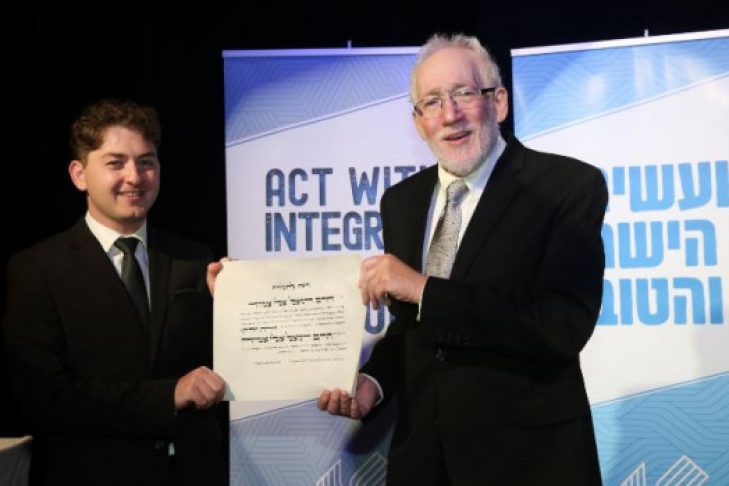On Sunday, May 26, Rabbi Daniel Landes of Jerusalem ordained Rabbi Daniel Atwood. Atwood had been denied semicha, or ordination, at his Modern Orthodox seminary in New York because he is gay. Landes, who is also Orthodox, stepped in and performed the ceremony in front of over 200 guests in Jerusalem. Landes recently spoke to JewishBoston about the halachic (legal) arguments on which he based his decision.
Landes, 68, was born in Chicago into a Modern Orthodox household. He describes his parents as “leaders in integration.” Landes was also involved in the civil rights movement, having marched with Martin Luther King Jr. When it came time to study for the rabbinate, Landes sought out Rabbi Joseph Soloveitchik, a Modern Orthodox thinker. Under Soloveitchik’s mentorship, Landes delved into texts about human dignity.
Landes went on to Los Angeles, where he helped to found a branch of Yeshiva University. He also served as the educational director for the Simon Wiesenthal Center for 19 years. Throughout that time, his role as a pulpit rabbi for a small progressive Orthodox congregation in Los Angeles deeply influenced him on egalitarian matters.
With his move to Israel, Landes became head of the non-denominational Pardes Institute of Jewish Studies. He recalled: “It was my first time teaching advanced Talmud to women and men together. I was hearing women’s voices—hearing what they had to say—and it changed my perspective on many things. I found it crucial to learn with men and women. It’s hard to be fully equal when both sexes are not present.” At Pardes, Landes went on to ordain a class of eight women and 12 men together in what he described as “the greatest night of my life except for family events.”
After his tenure at Pardes, Landes founded Yashrut, which “builds civil discourse through a theology of integrity, justice and tolerance…[and] includes a semicha (ordination) initiative, as well as programs for rabbinic leaders.” Landes said his students at Yashrut are observant, but at the same time are “allergic to the usual rabbinical school direction. All of them are on some spectrum of equity, equality and egalitarianism. Some of them, like myself, were in a mechitza minyan [services in which men and women worship separately]. They are responding to halachic decisions keeping in mind the reality and sociology of Judaism.”
Among the issues Landes has been grappling with is an interpretation of Leviticus 18:22. The Jewish Publication Society translates the verse as: “Thou shalt not lie with mankind, as with womankind; it is abomination.” These short sentences are central to the Orthodox prohibition of homosexuality. Landes noted that while he responds to the verse as an “Orthodox Jew who accepts the full Torah, I also accept that there are people who are fully gay.”
In a recent opinion piece distributed by the Jewish Telegraphic Agency (JTA), Landes offered nuanced interpretations of Leviticus vis a vis his position in acknowledging gay men and women. One concept is the notion that when something forbidden is done under duress, God exempts the person from punishment. Landes writes: “Homosexuality, viewed through halachic eyes, is fundamentally different. It does not have any release, substitute, or ‘cure’ other than a homosexual relationship. A few LGBTQ Jews might aspire and accomplish true lifelong celibacy, but the homosexual’s constant state of ohnes [or duress] clearly needs another category or description: It is complete in both duration and intensity.”
In the same JTA piece, Landes explored the rabbinic principle of Nishtano HaTeva—a nature change. “Leviticus 18:22 is not geared to full homosexuals but to heterosexuals who wish to experiment,” he said. He wrote how Maimonides extended the notion to Talmudic medicine, “which [Maimonides] no longer considered effective or even safe. In the Mishneh Torah, Maimonides does not prescribe any Talmudic medical practice that does not concur with his scientific judgment. The famed 20th-century Lithuanian sage, Hazon Ish, explains that Maimonides was simply allowing halacha to reflect the fact that scientific discoveries, as well as human bodies, had evolved. As elusive as this explanation may be, it nonetheless affirms that certain things in the human makeup may indeed change—and that our moral vision of halacha must keep up.”
While these interpretations may be a deep dive into the intricacies of Jewish law, they are fundamental to Landes’ main point. “I’m interested in having gay rabbis who can understand, in general, the issues and the needs of gay Orthodox Jews,” he said. “There is a crucial need for young men to have role models they can confide in, talk to, hash things out. On the other side, gay Orthodox rabbis can demand more from their congregants because they have a shared language, shared experience, shared issues.”
Despite some of the roadblocks to full acceptance of gay Jews by Orthodox communities, Landes is optimistic about the future. He sees Atwood’s ordination as a mark of social progress in Orthodox circles. Landes noted that it’s no longer acceptable in general society to hurl epithets at gay people. He added that most Orthodox Jews acknowledge that hurtful and clichéd assertions about gay people are not true. “Going forward, we’ll have to make decisions and think things through,” he said. “I want to be helpful in this very exciting time.”



